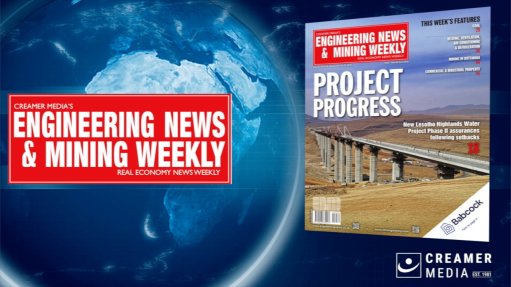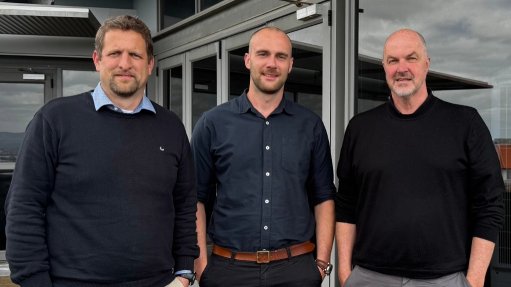Panellists discuss implications of diversifying the energy mix
As South Africa faces growing energy demand and environmental challenges, it is critical to address how diverse energy solutions can contribute to the resilience and sustainability of its industrial sector.
With this in mind, panellists at the Energy Intensive Users Group's Inaugural Convention discussed the implications, opportunities and challenges around diversifying the energy mix, especially for energy-intensive users in South Africa.
Moderated by South African National Energy Association secretary general Xolile Msimanga, the panel consisted of Stellenbosch University principal engineer Warwick Pierce, South African Oil and Gas Association gas economy leadership team chairperson Craig Morkel, South African Nuclear Energy Corporation group CEO Loyiso Tyabashe, South African Photovoltaic Industry Association CEO Dr Rethabile Melamu, and South African Wind Energy Association CEO Niveshen Govender.
Msimanga noted that South Africa’s energy landscape was at a “critical juncture,” particularly for energy-intensive sectors such as mining and manufacturing, noting that, with growing environmental pressures, regulatory requirements, supply challenges and escalating energy costs, optimising the energy mix had become a “strategic priority.”
“This involves diversifying beyond coal dependency to include cleaner, cost-effective and resilient energy sources such as renewables, natural gas, nuclear and energy storage solutions.
“By doing so, energy-intensive users can improve their operational stability, manage their costs and contribute to South Africa's broader goals of reducing carbon emissions and enhancing energy security . . . however, transitioning the energy mix brings its own set of challenges - a very complex set of problems faces all those involved, especially for large-scale users, who must balance immediate energy demands with long-term sustainability goals,” she said.
Additionally, Govender emphasised the importance of an energy mix that suited South Africa's needs, had the least environmental impact and addressed social mechanisms, highlighting the need for regulatory, structural and programmatic reforms to optimise the energy mix.
Regarding the role of solar PV in the South African energy mix, Melamu pointed out that solar PV responded to four key considerations, namely energy security, quality of supply, affordability and decarbonisation.
“We support an energy mix of all sorts, but we also believe solar PV is one of the cheapest technologies, especially if the generation profile matches the demand profile, and definitely should be considered as one of the solutions,” she said.
Further, Govender expressed the need for better energy planning, with strong leadership and collaboration.
“It can't be business as usual anymore. We need to look beyond baseload, we need to understand complex energy systems . . . with integrated grid balancing and management tools that the rest of the world are moving towards,” he noted.
CBAM AND CARBON TAX
Meanwhile, the topic of accelerating a just energy transition, which addressed the challenges posed by carbon taxes and the EU Carbon Border Adjustment Mechanism (CBAM), was also addressed at this year’s convention.
During a discussion titled ‘Expediting the just energy transition and mitigating the impacts of carbon tax and CBAM’, panellists discussed the impact of carbon tax and CBAM on South African industries.
Global carbon project developer The African Stove Company commercial director Storm Patel noted that South Africa had established flexibility mechanisms under the carbon tax, including the use of carbon offsets, to reduce tax burdens.
She highlighted that there had been some fundamental changes in the carbon tax regulations, noting that carbon offset allowance was, therefore, becoming increasingly important.
She explained that, while about 60% of emissions produced were tax free currently, this allowance was progressively going to be phased out, whereby government was then going to introduce more incentive-based allowances.
“One of them is that they're phasing in a higher carbon offset allowance. So we're going to be seeing that, by 2030, . . . or even as early as 2026, that offset allowance is going to be 20% to 25% up from the 5% to 10% and so this is really one opportunity for all carbon taxpayers to actually make use of this allowance to reduce that tax burden,” said Patel.
She urged the public to comment on National Treasury’s carbon tax discussion paper outlining Phase 2 of the carbon tax, which is out for public comment until December 13.
Comments
Press Office
Announcements
What's On
Subscribe to improve your user experience...
Option 1 (equivalent of R125 a month):
Receive a weekly copy of Creamer Media's Engineering News & Mining Weekly magazine
(print copy for those in South Africa and e-magazine for those outside of South Africa)
Receive daily email newsletters
Access to full search results
Access archive of magazine back copies
Access to Projects in Progress
Access to ONE Research Report of your choice in PDF format
Option 2 (equivalent of R375 a month):
All benefits from Option 1
PLUS
Access to Creamer Media's Research Channel Africa for ALL Research Reports, in PDF format, on various industrial and mining sectors
including Electricity; Water; Energy Transition; Hydrogen; Roads, Rail and Ports; Coal; Gold; Platinum; Battery Metals; etc.
Already a subscriber?
Forgotten your password?
Receive weekly copy of Creamer Media's Engineering News & Mining Weekly magazine (print copy for those in South Africa and e-magazine for those outside of South Africa)
➕
Recieve daily email newsletters
➕
Access to full search results
➕
Access archive of magazine back copies
➕
Access to Projects in Progress
➕
Access to ONE Research Report of your choice in PDF format
RESEARCH CHANNEL AFRICA
R4500 (equivalent of R375 a month)
SUBSCRIBEAll benefits from Option 1
➕
Access to Creamer Media's Research Channel Africa for ALL Research Reports on various industrial and mining sectors, in PDF format, including on:
Electricity
➕
Water
➕
Energy Transition
➕
Hydrogen
➕
Roads, Rail and Ports
➕
Coal
➕
Gold
➕
Platinum
➕
Battery Metals
➕
etc.
Receive all benefits from Option 1 or Option 2 delivered to numerous people at your company
➕
Multiple User names and Passwords for simultaneous log-ins
➕
Intranet integration access to all in your organisation

















